Email Phrases And Business Cliches That Bury Your Outreach Forever
1. Business email greeting phrases that are overused
2. Email phrases in the body of your email
3. Business email ending phrases
4. Apology email cliches
5. Business cliches in follow-up emails
Useful tools:
1. Newoldstamp - Email signature marketing
2. Mailchimp - Email builder and sender
3. Reply.io - Personal email outreach, calls, and tasks
4. Mailtrack - Email link opens tracking
5. Canva - Online tool for making designs
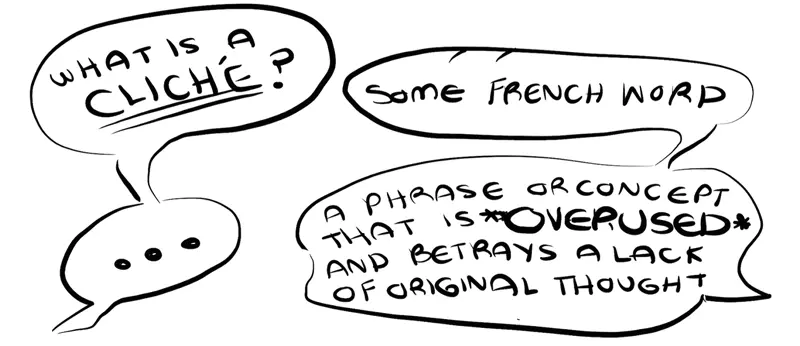
I am sick and tired of boring cliches and meaningless lines in my inbox. Maybe today I’m getting something better. Oh, it looks like I have some new emails here.
- “Dear Sir or Madam, I hope you are doing well!”
- “Yeah… I’m well enough to move your email to trash without reading further since you didn’t even bother to copy my name from my email address.”
Next!
- “To be honest..”
- “Wait ... were you not being honest with me until now?”
And the last shot.
- “Yours truly.”
- “You’d think I just dug out a letter from the Victorian era. Bad news. No, it was written in 2023.”
If you are still using these phrases, don’t be offended but realize, maybe you just found the reason why people rarely respond to your emails.
And if your goal is to communicate effectively and get what you want, remember that a good email takes time and effort to write it. Also, people get so many emails today that they have no real choice other than to be frustrated because of empty phrases and delete most of the messages they get within seconds of opening them.
In this article, we will cover the most common business cliche phrases and the best alternatives to replace them.
Business email greeting phrases that are overused
The way you start your email sets the tone and may shape the recipient’s perception of you. Along with a subject line, it may also determine whether they keep on reading. Here are the seven phrases that you should either delete or find substitutes for if you don’t want to be that annoying guy whose email “finds the reader well.”
-
How are you?
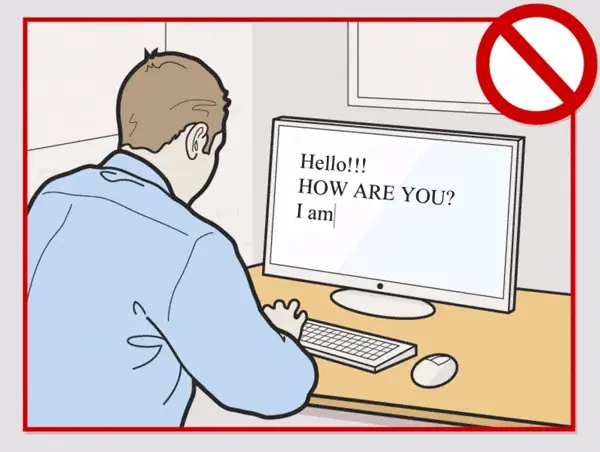
source: Businessinsider
I know that you are trying to be polite, but as a rule, the sender doesn’t really want to know, and the recipient doesn’t tell the truth. So what’s the point? If you are genuinely interested and know the recipient well, it’s better to take the time to write something more personalized. For example, “I enjoyed your Tweet about [topic],” “It was a pleasure to meet you at the conference. Whose speech did you like the most?” Those serve pretty much the same function as “How are you?” but require much effort.
-
I’m John, and I work for John Inc.
If you start your email with this phrase to add some authority, remember that there is always the flip side of the coin: recipients can perceive you as an arrogant person. If you want to make a professional email signature, it’s a wise idea to include your name and job title at the end.
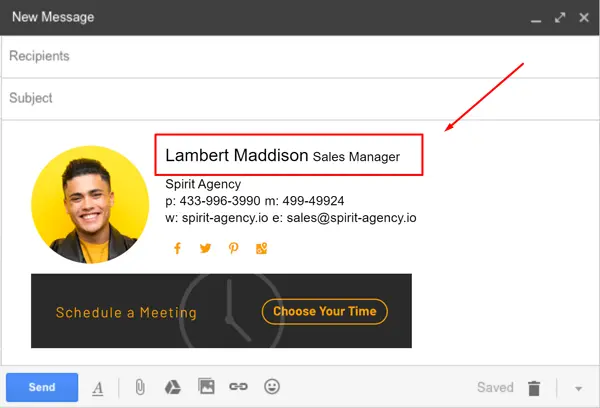
-
I hope you’re doing well
Another common automatic filler phrase we overuse in emails is “I hope you’re doing well.” Just as “How are you?” these words no longer have any significance.
-
I hope this email finds you well
If you want people to reply to your email, make sure it brings value to them. Since this cliche doesn’t seem to bring any real value, you can delete it without any doubt. Instead, show that you respect the reader’s time and get to the point right away.
-
Per our conversation
This one belongs to the most dangerous cliches in business communication. Not only does it sound too officious and formal, but also recipients may see it as demanding or even aggressive. To avoid confusion, it is better to restate the conversation politely. For example, “When we met last time, we agreed that you would draft the quarterly report by October 25.”
-
I know you’re busy
When you make such statements in your emails, you can’t count on people to take you seriously. You can write: “I know you are busy,” the recipient will read: “My time is less valuable than yours.”
-
I just wanted to reach out to you
It’s time-consuming. Wouldn’t it be more efficient to skip all the explanations and express the action you are asking the reader to take?
Ideas to improve
Here is what you can do instead.
-
Get straight to the point
Busy people often prefer straightforward and concise emails over the sweet ones. They don’t want your explanations about why you are reaching out. And the sooner you get to the point, the happier your recipients will be. Besides, you can still keep the tone of your email sweet and polite without any filler phrases.
-
Start a small talk
If you know the person you are writing to, it never hurts to remind them that you have an existing relationship. For example, “I hope you enjoyed the rest of your stay in Chicago after the meeting.”
Email phrases in the body of your email
After you expressed your hope that your email found the recipient well, you should carefully choose another meaningless phrase or even two not to get down to business as long as you can. Joking. Unless you hate the recipient, and your goal is to make them mad.
Here are some common cliches to avoid in the body of your email.
-
The problem is…
Almost every time I email customer support asking for help with an app or a device, they start their explanation with the phrase “the problem is.” And you know why I hate it? Because it sets a negative tone to the email. I am sure that every customer would be happy to hear about the fix, not about the problem. No one likes problems.
-
To be honest
Are you typically dishonest? If not, cut this one off and focus on telling it like it is.
-
My company specializes in
As a rule, this email phrase comes together with something like, “Hello. My name is John.” There are two reasons why this pair is not good. If you use it and expect to be perceived as a professional, keep in mind that expressing yourself separately from your company doesn’t do you any favors. Also, “specialize” is a dry and formal word, which doesn’t speak to your audience. Using this phrase, you make the recipient see nothing but another generic company who hasn’t upgraded their email templates for years. If you want to distinguish yourself from the competition, do anything possible to sound more natural, as if you were talking to a person outside the Internet.
-
Please note that
If you don’t want to sound condescending, use alternatives such as “be advised” or “for your reference.” Sometimes, you can even omit the “please note” phrase without losing the point.
-
I think
If you say “I think of you,” that’s okay. But If you say “I think I can help you,” this means you are unsure. Are you?
-
As I previously mentioned
How many people do you interact with via email? If the number is more than five, I can hardly believe that you remember exactly what each of them said in a long thread of messages. Next time when you write “As I previously mentioned,” simply restate the information without suggesting that you already shared it.
-
Checking in
This cliche can be met in subject lines mostly. Does it bring any value or offer specific information about the email’s contents? Of course, no. Instead, it can easily scare the recipient off. If you have something specific in mind you want to discuss, indicate that in the subject line.
-
Please find attached
There is nothing wrong with writing “Please find attached” in emails if you aim to sound like a nineteenth-century lawyer. In other cases, consider using alternatives such as “I have attached a document for you,” “Please refer to the attached pdf for more details,” “Relevant information is in the attached file.”

-
I completely understand how you feel
Even if you’ve ever been in the exact situation as a person on the other side of the screen, don’t expect they feel better after you let them know you can relate. No matter if you intended to be supportive and empathetic, the above phrase can cause even more frustration and anger. That’s why it is better to repeat the issue using their words to make them feel understood. For instance, “I can definitely see how this is frustrating for you, and I want to make sure we’re addressing the issue as soon as possible.”
Ideas to improve
The above-mentioned business cliches and phrases contribute nothing to the message. Also, they set either a negative or condescending tone to your emails. What can you do about this?
-
Be more conversational
To sound more natural and friendly, try to write so that it doesn’t look like you’re writing but speaking to the recipient face-to-face.
Business email ending phrases
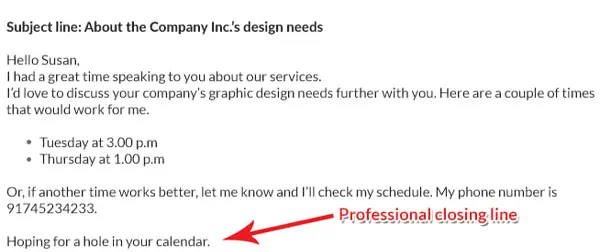
source: Saleshandy
If you have a salutation, you should also have a closing to balance it out. Here are a few phrases to avoid with professional email sign-offs:
-
Best
Not the worst sign-off in the world, but keep in mind, though, that the overuse of “Best” can make you seem dull and unimaginative.
Looking forward to hearing from you
Doesn’t it look like this is just a polite way of saying “You’d better reply to my message quickly”? Try something like “Eager to know what you think” instead.
-
Don’t hesitate to contact me
If you need further clarification from a sender who didn’t use this phrase in the initial email, wouldn’t you ask for the information? Not only is this phrase redundant but also old-fashioned and too formal. It’s better to omit it or just say, “You can contact me for further clarification” if you still feel the need to emphasize that you are ready to answer questions.
-
Sincerely yours
It is a bit outdated and very formal. If you don’t know the recipient, the phrase can even make you sound too eager to please.
-
Thanks in advance
Obviously, gratitude is an excellent way to end an email if you want to hear back from the reader. However, you better should be careful with “Thanks in advance,” because, depending on the context, it can make you sound like “I expect you to do this, and you have no other choice because I already thanked you.”
-
Cheers
“Cheers” isn’t the best option if you want to sound friendly without coming across as unprofessional. I’d recommend using this sign-off only for friends and business colleagues you might meet for a drink later.
-
Yours truly
Do you belong to the recipient? If not, this just sounds fake and overly familiar.
Ideas to improve
Here are a few ideas on how you can end your email.
-
Ask a question
Talking with people is often more productive than talking at them. And a good question can turn a one-way email into a conversation. Here are a couple of examples: “Have you tried any of those strategies? I have a few more interesting ideas for your project” or “I saw your post about transitioning from marketing to product management - that’s impressive. How long did it take you to become a competent PM?” or “I will send you an invite as soon as I finalize the presentation. Sounds good?”
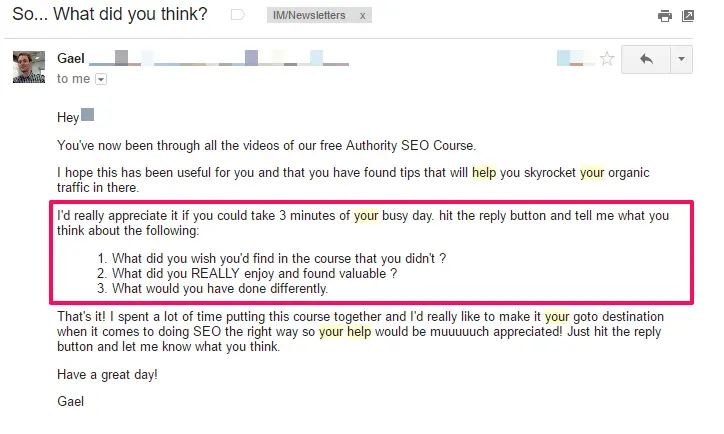
source: Thrivethemes.com
-
Add a relevant call-to-action
If you want to hear back from people you contact, tell them what you expect them to do. For example, “Would you please let me know by March 11th if you will be able to attend?”
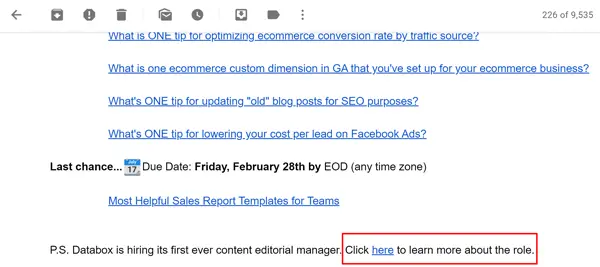
If you’d like more advice on email closing lines, check out our article.
Apology email cliches
While it’s essential to take responsibility and apologize from time to time, many people do it way too often. When you say “I’m sorry” all the time, your apology loses its value. So be careful when using the following phrases in your emails.
-
Sorry to bother you
Empty statements like “Sorry to bother you” are polite, but it would be better if you concentrate on more important things. If your message is short and to the point, chances are the recipient will be able to read it right away. There is no need to make your email any longer with filler words.
-
Sorry for the late reply
A person might not even realize it took you too long to respond until you highlight it. In case you still feel the need to apologize, consider using phrases like, “Thank you for your patience,” “Thank you for understanding.” These messages do both acknowledge your slip and compliment the recipient.
-
Sorry for the inconvenience
“I apologize for the inconvenience” is one of the most overused phrases, especially in customer service. But do these words provide help or convey a genuine message? It is better to say exactly what you are sorry for and what you will do to solve the problem.
Ideas to improve
What should you do? Reserve your apologies for the times you really owe them and avoid overusing them because sooner or later, you will lose credibility.
-
Don’t be sorry, be thankful
Yes, most of your recipients are busy, and your message can distract them from important things. However, if your email is personalized, concise, and provides useful information, they won’t mind the interruption. Instead of saying “sorry” all the time, look at the situation from a different angle. Maybe, you can say “thank you” and compliment the reader instead. For instance, “Thank you for your patience.”
-
In case you’re sorry, try to apologize
In case you want to apologize, try to avoid cliches and see if you can choose something more personalized to the situation. For example, “I’m sorry my dog ate your tulips.”
Business cliches in follow-up emails
For me, writing a decent follow-up is even a harder task than writing a good first email. Every time I follow up, I feel the temptation to use the phrases that we all know. Those are “In case you missed this,” “Not sure if you received my last email,” “Just following up,” and more. But here’s how recipients may perceive your words when you are using these seemingly innocent email cliches.
-
I’m reaching out last time
Seriously, avoid playing manipulation games. This is unprofessional.
-
In case you missed this
Well, maybe a person did miss this. And maybe they just weren’t interested. When I see this type of follow-up, for me, it sounds like “You are not doing what I said you should be doing. Do I really have to repeat myself?”
-
I thought I would circle back
A recipient didn’t respond the first time you emailed. Why will they respond this time, especially when the rest of your message is just copied and pasted from your original message?
-
I’m just following up
If you want to be noticed by the reader, try to find a more creative opening line.
-
Not sure if my last email was received or not sure if you saw my last email
Really? We live at a time when anyone can track email opens. Don’t use this phrase, because it sounds like “Just how long you think you can ignore me?”
-
Per my last email
This one can come off as passive-aggressive. It is better to restate your previous message.
Ideas to improve
Here are a few things you can do to improve your follow-ups.
-
Again get to the point
In addition to restating your request or point, consider adding new information in your follow-up email.
-
Add a short overview of your request
Perhaps, this will increase your chances of getting a reply, as people love shorter emails.
-
Don’t put the fault on your recipient
Never blame the reader for not getting back to you. It won’t help if you do that. Sometimes, it’s useful to assume that they didn’t respond not because they were bad, but because your email wasn’t persuasive enough to provoke immediate action.
Read our article “How to Write The Best Follow up Emails After No Response: Tips and Examples.”
Conclusion
The average person spends about eleven seconds reading an email. If you want to be heard, try to get straight to the point avoiding business email cliches such as “Per our conversation,” “Just following up,” “I hope this email finds you well,” “Don’t hesitate to contact me,” and more. And remember, every email doesn’t need to be a masterpiece, but it needs to serve its function.


